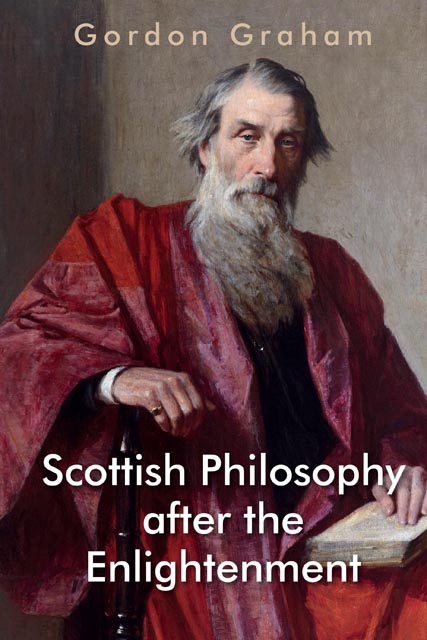Book contents
- Frontmatter
- Contents
- Preface and Acknowledgements
- Series Editor’s Introduction
- A Note on Women in Scottish Philosophy: Mrs Oliphant
- A Chronology of Scottish Philosophy after the Enlightenment
- 1 An Autobiographical Prologue
- 2 Sir William Hamilton and the Revitalisation of Scottish Philosophy
- 3 James Frederick Ferrier and the Course of Scottish Philosophy
- 4 Psychology and Moral Philosophy: Alexander Bain
- 5 Thomas Carlyle and the Philosophy of Rhetoric
- 6 Hegelianism and its Critics
- 7 Scottish Philosophy’s Progress
- 8 Religion, Evolution and Scottish Philosophy
- 9 The Gifford Lectures and the Re-affirmation of Theism: Alexander Campbell Fraser
- 10 The Culmination of Scottish Philosophy: A. S. Pringle-Pattison
- 11 John Macmurray and the Self as Agent
- Bibliography
- Index
9 - The Gifford Lectures and the Re-affirmation of Theism: Alexander Campbell Fraser
Published online by Cambridge University Press: 07 June 2023
- Frontmatter
- Contents
- Preface and Acknowledgements
- Series Editor’s Introduction
- A Note on Women in Scottish Philosophy: Mrs Oliphant
- A Chronology of Scottish Philosophy after the Enlightenment
- 1 An Autobiographical Prologue
- 2 Sir William Hamilton and the Revitalisation of Scottish Philosophy
- 3 James Frederick Ferrier and the Course of Scottish Philosophy
- 4 Psychology and Moral Philosophy: Alexander Bain
- 5 Thomas Carlyle and the Philosophy of Rhetoric
- 6 Hegelianism and its Critics
- 7 Scottish Philosophy’s Progress
- 8 Religion, Evolution and Scottish Philosophy
- 9 The Gifford Lectures and the Re-affirmation of Theism: Alexander Campbell Fraser
- 10 The Culmination of Scottish Philosophy: A. S. Pringle-Pattison
- 11 John Macmurray and the Self as Agent
- Bibliography
- Index
Summary
I
In 1855, at the unusually early age of thirty-one, John Tulloch was appointed Principal of St Mary’s College, the Divinity Faculty of the University of St Andrews. In the same year, he was awarded the Burnet Prize for an essay entitled ‘Theism: The Witness of Reason and Nature to an All-Wise and Beneficent Creator’, published as a book shortly afterwards by William Blackwood and Sons. Tulloch’s essay was interesting in at least two respects. At St Andrews, as well as Principal, he occupied the Chair of Systematic Theology and Apologetics, and his essay signalled a move away from the doctrinaire and rather narrow Calvinistic theology of his predecessors towards a more liberal ‘rational theology’. This more liberal theology lay at the heart of Tulloch’s influential contribution both to the Church of Scotland as it emerged from the trauma of the ‘Disruption’ in 1843, and to the study of theology in the Scottish universities. On the other hand, Tulloch’s liberalism in theology conceded nothing to recent trends in philosophy. His defence of theism had the rising tide of Positivism in its sights no less than dogmatic Calvinism. Auguste Comte’s six-volume Course on Positive Philosophy had been published between 1830 and 1842, and enthusiastically welcomed by John Stuart Mill, who tells us that while the main elements of his System of Logic were formulated by the time he read Comte, ‘his book was of essential service to me in some of the parts that still remained to be thought out’ (Mill 1971: 126). Mill regarded Comte’s subsequent Treatise on Sociology, Instituting the Religion of Humanity (1851–4, four volumes) with considerably less favour, though he did pick up on the expression ‘religion of humanity’ in his posthumously published essay ‘The Utility of Religion’. In Scotland, Alexander Bain became the standard bearer of a version of positivism when, with Mill’s support, he was appointed Regius Professor of Logic in Aberdeen in 1860.
Tulloch was Principal of St Mary’s for over thirty years. It was a period that witnessed the publication of a number of remarkably influential books. Most notable was Darwin’s On the Origin of Species by Means of Natural Selection, published in 1859, and followed in 1871 by The Descent of Man, and Selection in Relation to Sex.
- Type
- Chapter
- Information
- Scottish Philosophy after the Enlightenment , pp. 167 - 187Publisher: Edinburgh University PressPrint publication year: 2022

